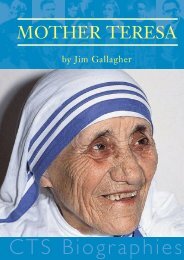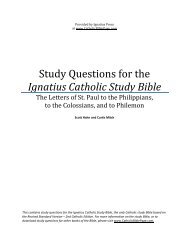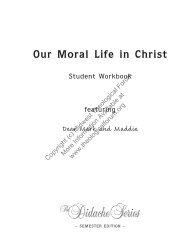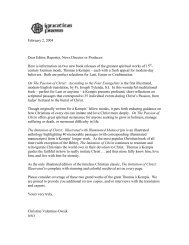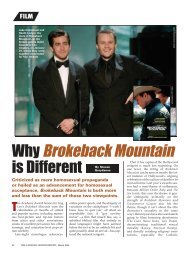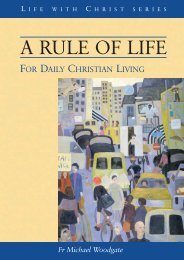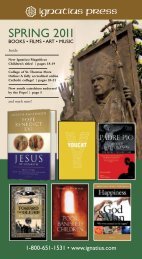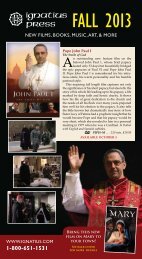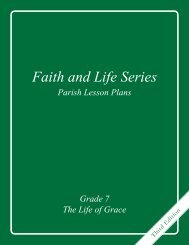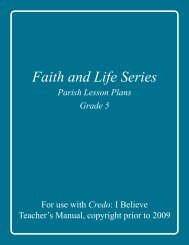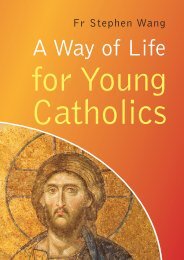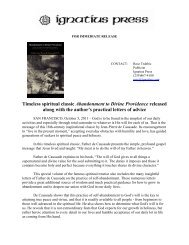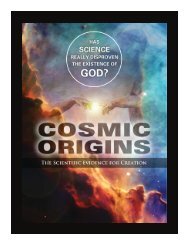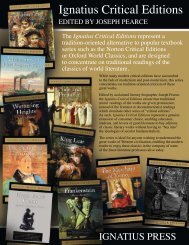SPRING 2013 - Ignatius Press
SPRING 2013 - Ignatius Press
SPRING 2013 - Ignatius Press
- No tags were found...
You also want an ePaper? Increase the reach of your titles
YUMPU automatically turns print PDFs into web optimized ePapers that Google loves.
new <strong>SPRING</strong> books<br />
Do No Harm A Novel<br />
Fiorella de Maria<br />
When a British emergency room doctor saves<br />
the life a woman who apparently attempted<br />
suicide, he is accused of committing a crime and<br />
stands trial. Not only is Dr. Matthew Kemble’s<br />
medical practice at risk, but also his liberty. If he is<br />
found guilty of trespassing on a woman’s right to<br />
die, he could go to jail.<br />
The novel Do No Harm exposes the dangers faced<br />
by conscientious doctors in Britain. Dr. Kemble’s<br />
decision to treat a patient in defiance of her Living<br />
Will pits him against English Law, public opinion<br />
and his own profession. The legal and personal<br />
battles he faces raise many questions about the role<br />
of the physician in the modern world, contemporary<br />
beliefs about autonomy and human rights, and the<br />
increasingly bitter clash of values in twenty-first<br />
century Britain.<br />
Set in and around London, the story explores the<br />
interrelated stories of a physician facing ruin and<br />
imprisonment at the height of his career, his old<br />
friend and doggedly determined lawyer, Jonathan<br />
Kirkpatrick, and Maria, a passionate, dedicated<br />
but intensely lonely young campaigner who while<br />
working for the defense proves incapable of staying<br />
out of trouble herself.<br />
“A gripping drama of ordinary human beings<br />
caught in a web of ethical confusions and moral<br />
complexities. It presents to us the razor’s edge of<br />
conscience in an age dominated by relativism:<br />
What can people of good will do when faced with<br />
layers of evil in contemporary society, evils that<br />
present themselves as rational, legal, even ‘moral’<br />
This novel is a biopsy of the sickness of late<br />
Western society, and more importantly a sign that<br />
we are not abandoned in the midst of it, and that<br />
good can triumph against all odds.”<br />
Michael D. O’Brien, author, Father Elijah<br />
Fiorella de Maria was born in Italy of Maltese parents.<br />
She lives in Surrey with her husband and her three<br />
children. She won the National Book Prize of Malta<br />
(foreign language fiction category) for her novel The<br />
Cassandra Curse. Her first novel with <strong>Ignatius</strong> <strong>Press</strong>,<br />
Poor Banished Children, was released in 2011 (see p. 69)<br />
DNH-H . . . Sewn Hardcover, 235 pp, $19.95<br />
E indicates availability as an e-Book on ignatius.com<br />
A indicates availability as an audio download on ignatius.com<br />
8<br />
Shakespeare on Love<br />
Seeing the Catholic Presence<br />
in Romeo and Juliet<br />
Joseph Pearce<br />
Having given the evidence for William<br />
Shakespeare’s Catholicism in two previous<br />
books, literary biographer Joseph Pearce turns his<br />
attention in this work to the Bard’s most famous<br />
play, Romeo and Juliet.<br />
“Star-crossed” Romeo and Juliet are<br />
Shakespeare’s most famous lovers and perhaps the<br />
most well-known lovers in literary history. Though<br />
the young pair has been held up as a romantic<br />
ideal, the play is a tragedy, ending in death. What<br />
then, asks Pearce, is Shakespeare saying about his<br />
protagonists Are they the hapless victims of fate,<br />
or are they partly to blame for their deaths Is their<br />
love the “real thing”, or is it self-indulgent passion<br />
And what about the adults in their lives Did they<br />
give the young people the example and guidance<br />
that they needed<br />
The Catholic understanding of sexual desire,<br />
and its need to be ruled by reason, is on display in<br />
Romeo and Juliet, argues Pearce. The play is not a<br />
paean to romance but a cautionary tale about the<br />
naïveté and folly of youthful infatuation and the<br />
disastrous consequences of poor parenting. The<br />
well-known characters and their oft-quoted lines<br />
are rich in symbolic meaning that points us in the<br />
direction of the age-old wisdom of the Church.<br />
Although such a reading of Romeo and Juliet is<br />
countercultural in an age that glorifies the heedless<br />
and headless heart of young love, Pearce makes<br />
his case through a meticulous engagement with<br />
Shakespeare and his age and with the text of the<br />
play itself.<br />
“Joseph Pearce’s book on Romeo and Juliet<br />
stands like a lighthouse in the murk of modern<br />
literary criticism.”<br />
Thomas Howard, author, Chance Or the Dance<br />
SHAKL-P . . . Sewn Softcover, 160 pp, $14.95<br />
See more on Shakespeare by Pearce on page 28<br />
See plays by Shakespeare in the <strong>Ignatius</strong> Critical<br />
Editions on pages 20-21<br />
1-800-651-1531<br />
www.ignatius.com



